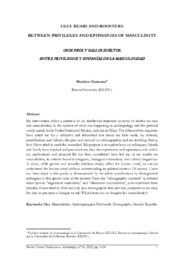Resumen :
My intervention offers a narrative of my intellectual trajectory in terms of studies on men and masculinities, in the context of what was happening in anthropology and the political world, mainly in the United States and Mexico, and also in China. The editors of the magazine have asked me for a reflective and theoretical text about my field work, my detours, contributions and failures, the pros and cons of my ethnographies and my teaching, that is, how I have tried to mark the unmarked. My purpose is to explore how my colleagues, friends and family have inspired and provoked me, how the experiences and aspirations with which my professional and personal life has been constituted have led me, in my studies on masculinities, to criticize harmful categories, biological extremisms. and cultural stagnation. In short, while gender and sexuality relations deeply affect the human mind, we cannot understand the human mind without understanding its political context. Of course, I have not been alone in this quest, as demonstrated by the other contributions by distinguished colleagues in this special issue of the journal. From the “ethnographic moment” to debates about power, “hegemonic masculinity” and “alternative masculinities”, over more than three decades, I have tried to offer not only new ethnographic data and new perspectives on men, but also to promote a dialogue to ask: What future can we imagine for masculinities?
Mi intervención ofrece una narrativa de mi trayectoria intelectual en términos de estudios sobre los hombres y las masculinidades, en el contexto de lo que estaba sucediendo en la antropología y el mundo político, principalmente en Estados Unidos y México, y también en China. Los editores de la revista me han pedido un texto reflexivo y teórico sobre mi trabajo de campo, mis desvíos, aportaciones y fracasos, los pros y contras de mis etnografías y mi docencia, es decir, cómo he intentado marcar los no marcados. Mi propósito es explorar cómo mis colegas, amigos y familiares me han inspirado y provocado, cómo las experiencias y aspiraciones con las que se ha constituido mi vida profesional y personal me han llevado, en mis estudios sobre masculinidades, a criticar categorías nocivas, extremismos biológicos y estancamiento cultural. En resumen, mientras que las relaciones de género y sexualidad afectan profundamente a la mente humana, no podemos entender la mente humana sin comprender su contexto político. Por supuesto que no he sido el único en esta búsqueda, como lo demuestran las otras contribuciones de colegas distinguidos en este número especial de la revista. Del “momento etnográfico” a los debates sobre el poder, “la masculinidad hegemónica” y “las masculinidades alternativas”, a lo largo de más de tres décadas, he intentado ofrecer no sólo nuevos datos etnográficos y nuevas perspectivas sobre hombres, sino promover un diálogo para preguntar: ¿Qué futuro podemos imaginar para las masculinidades?
|
 La licencia se describe como: Atribución-NonComercial-NoDerivada 4.0 Internacional.
La licencia se describe como: Atribución-NonComercial-NoDerivada 4.0 Internacional.
.png)
